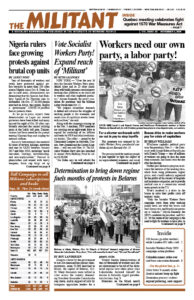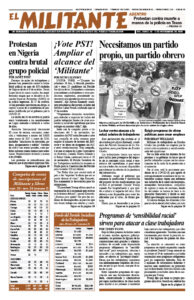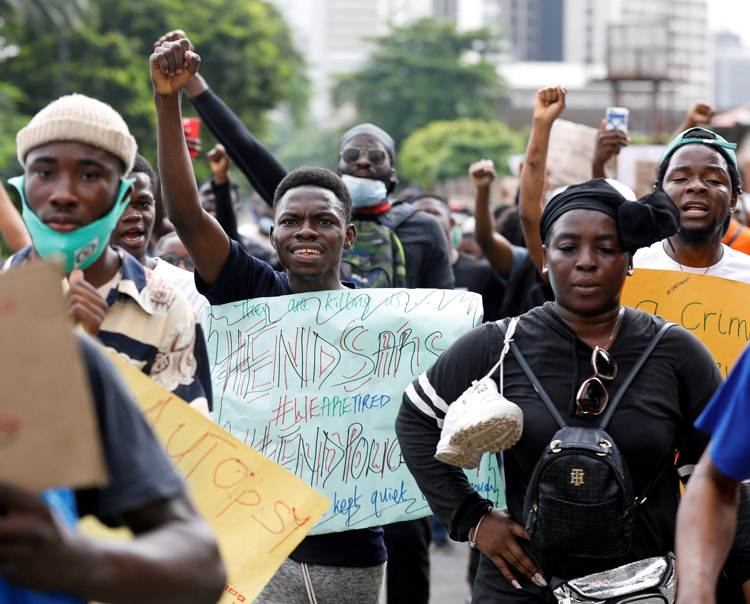Tens of thousands of workers and youth have protested against police brutality in more than 100 cities across Nigeria since Oct. 8. From Lagos to rural areas, demonstrators are demanding that the Special Anti-Robbery Squad of the Nigerian cops be disbanded. On Oct. 17, 10,000 people marched in Abuja, the capital, despite a government COVID-19-justified ban on protests there.
As we go to press, reports from demonstrators in Lagos say several protesters have been killed and many injured the night of Oct. 20 after cops brutally attacked the central rallying point at the Lekki toll gate. Demonstrators had been seated on the ground waving Nigerian flags and singing the national anthem.
Amnesty International documented 82 cases of torture, killings, extortion and rape by SARS between January 2017 and May 2020, including “mock execution, beatings, waterboarding, and near-asphyxiation.” Dressed in plainclothes and armed with heavy weapons, these cop thugs set up roadblocks and checkpoints to extort money. They regularly stop and harass young people — the average age in Nigeria is 18.
Even after Nigerian President Muhammadu Buhari announced Oct. 11 that the Special Anti-Robbery Squad would be disbanded, the protests just intensified. Buhari has made this promise before, and says he is now putting together a national SWAT unit, including former SARS cops. That same day authorities ordered all members of this police squad to report to Abuja for “debriefing and psychological examination” in order to re-up.
“I think about 80% of the people, most of them young, were attending protests for the first time,” Oladunni Segun, a leader of the Amilcar Cabral Ideological School Movement, told the Militant by phone from Lagos Oct. 18. “And they would protest all day.”
Sheriff Sholagbade, also a leader of the group, told the Militant that the government’s efforts to undercut the protests have failed, and they’re “getting bigger and bigger.” He said that they also provide an opportunity to discuss politics and what confronts working people in Nigeria today.
“Police will remain police,” Segun said. “They are an institution of class repression for the capitalists. We need to see the bigger struggle beyond just police reform.”
Before the Oct. 20 murderous assault, 10 protesters had been killed and dozens injured as the cops used tear gas, water cannons and live ammunition. Demonstrators are demanding justice for those killed, compensation for their families, immediate release of all those arrested and an independent body to investigate and prosecute police abuse.
The protests take place amid a deepening economic crisis and the continuing spread of coronavirus. The virus-related lockdowns on production and trade have had a big effect on the capitalist economy — the largest in Africa.
Nigeria is also the most populous country in Africa. Some 35% of Nigerians aged 15-34 are unemployed. More than half the country’s 206 million people are estimated to live on less than $2 a day, and life expectancy is only 54 years. Inflation is rising and revenues from oil, the country’s biggest natural resource, have plunged.
As of mid October, over 60,000 Nigerians had contracted COVID-19.
Nigerian immigrants and supporters have held actions in solidarity with the protests, including in Berlin, London, Toronto, New York, Atlanta, Houston, and Washington, D.C.
“Last week, they harassed me and my friends. They said they wanted to feast on us,” 23-year-old Seun Gbadamosi told Al Jazeera at a rally in Ibadan. “This is why we protest. This is why we march. We want total disbandment.”
On Oct. 15 the Nigerian army warned demonstrators — calling them “subversive elements and troublemakers” — that it would back the government “in whatever capacity to maintain law and order.” The military has announced a nationwide armed exercise, called Operation Crocodile Smile, to take place from Oct. 20 to Dec. 31.


